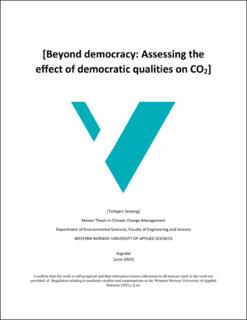| dc.description.abstract | Democracy is the preferred system of government when social and economic development is the goal, but what is the effect of democratization on climate change mitigation? Two decades of research into this question has so far led to ambiguous conclusions. This has prompted authors to question some of the assumptions in these studies, in particular the fact that all democracies are treated the same and measured by few and similar democracy indices. This thesis contributes to the discussion by going beyond the narrow definition of democracy and, instead, investigating the effects of several democratic qualities on CO2 emissions. The thesis introduces theoretical insights from environmental political science research and creates a framework for hypothesizing the effects of electoral democracy, liberal democratic qualities, deliberative democratic qualities, egalitarian democratic qualities and participatory democratic qualities on CO2 emissions in countries. The hypotheses are tested using mixed effects models with random slope and intercept and a temporal correction structure to account for serial correlation on a panel of 161 countries over 23 years, both for the entire panel and for different income-groups. The thesis provides two robust findings that have important policy implications. Firstly, increasing regional democracy in low-income countries is associated with an increase in CO2 emissions per capita. Secondly, and most importantly, increasing egalitarian democratic qualities in countries correspond with a rather strong increase in CO2 emissions per capita throughout the sample. Egalitarian democratic qualities measure the level of equal access to power, equal protection of rights and liberties and equal distribution of resources between and within genders and social groups, indicating that a trade-off exists between reducing inequalities and mitigating climate change. In a sustainable development context, this means that certain sustainable development goals, such as “inclusive and equitable quality education” (SDG 4) and reducing “inequalities within and between countries” (SDG 10) are in direct conflict with effective climate action, and that mitigating climate change might require an even stronger effort than anticipated to avoid unwanted trade-offs. | en_US |

